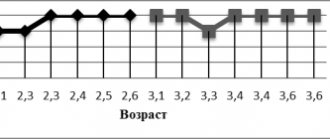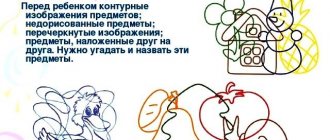The mental development of a preschooler is of great importance in the development of a bright and full-fledged person. The preschool period in the life of a modern person is only seven years. However, despite its short duration, it is one of the most important. At this time, the foundations of personality are formed.
Here it is very important to know the individual traits of a preschooler. They will help shape the child’s inclinations, which will then become the main foundation for entering the school education system. Parents should pay attention to the mental development of children of senior preschool age.
Features of the mental development of a child of senior preschool age
Psychology has an activity approach. It was studied by the Soviet psychologist and teacher Alexei Nikolaevich Leontiev, as well as his followers. They, relying on the works of Lev Semenovich Vygotsky, made a substantiation of the age structure. One of the main criteria for this structure is the so-called neoplasm.
Among the basics of neoplasm, we want to highlight 3 important factors:
- arbitrariness – the child’s will is formed, and he is already beginning to set goals and move towards them;
- visual-figurative thinking evolves - the child can already establish connections between images;
- The volume of memory increases - the preschooler independently sets himself the goal of retaining something in memory.
All these features indicate that it is simply necessary to study mental arithmetic. After all, classes using the methods of the “AMAKids Academy for the Development of Intelligence” are capable of developing memory and imaginative thinking (working with an imaginary abacus helps). Lessons speed up children's perception and processing of information significantly. In addition, they develop the necessary goal-setting qualities for an interest in self-development and learning new things. Classes at AMAKids are held in an interesting playful way, which is also important for developing a preschooler’s intelligence.
Psychologists and teachers highlight the formation of mathematical concepts as a separate and very important point. Mental arithmetic is a super exercise for the brain. If previously more hopes were placed on classical mathematics, now more and more on the development of the child with the help of mental calculation through the visualization of the abacus.
As an example, we can cite the mathematical abilities of mental arithmetic of AMAKids student Savva Tikhnenko, who is known for his participation in television programs. He amazed everyone with his mathematical abilities in Maxim Galkin’s show “Best of All.”
Diagnostic examination of preschool children by a psychologist
In order to study the developmental characteristics of preschool children, a variety of methods are used. These are mainly tests that allow us to determine the child’s personal characteristics, the level of his mental development, as well as his psychological readiness for school. The psychology of preschool children is involved in the development of approaches to examination, methods, rules of conduct, and interpretation of results.
By the age of 5-6 years, a child already perceives information well by ear, can retell what he heard, and explain the answer to a question. Logical thinking, operations of analysis and synthesis, generalization, and classification develop. Since voluntary behavior at this age is still just being formed, psychodiagnostics of children should include tasks that affect both the voluntary and involuntary levels of cognitive processes.
Methods for preschoolers are mainly aimed at determining the formation of prerequisites for educational activities, the level of personal and cognitive development of a preschooler, and the characteristics of his motivational and need sphere.
Psychodiagnostic methods for preschool children are not limited to special tasks and tests. Optimal psychodiagnostic results are achieved by observing children while playing with peers or alone. As a rule, this process reflects the characteristics of relationships with parents, the degree of conflict and aggressiveness of the child, and the ability to obey rules and norms. Projective, drawing tests are great for young children. A piece of paper displays all experiences and problems, emotional state and degree of self-confidence.
An important condition for obtaining reliable results is the establishment of psychological contact between the preschooler and the psychologist. Only in this case will diagnostics of development be justified. If a child is forced or intimidated, the test results can be greatly distorted. If necessary, it will be recommended to attend correctional and developmental classes with a psychologist, speech therapist, speech pathologist or other specialist.
Difficulties in the mental development of preschool children
The psychological characteristics of older preschoolers are that due to rapid growth, contradictions appear that affect the child’s emotions and actions. The main driving forces for the development of children under 7 years of age are the following factors:
- the world;
- new opportunities;
- greater physical activity;
- desire to communicate with friends and strangers.
Due to some difficulties, this development may be delayed. Here we list a number of these problems:
- problems related to emotions or personality (temper, melancholy and sadness, fear of something);
- slow formation of the cognitive process, which includes poor memory, a small vocabulary, lack of understanding of what is happening, lack of attention;
- behavior problems (the child tells lies, is rude, is rude, is arrogant);
- problems associated with neurology (restless sleep, excessive fatigue);
- problems related to communication (excessive resentment towards others, isolation in one’s own little world).
Psychological characteristics of senior preschool age (5-6 years)
Age 5-6 years is senior preschool age. It is a very important age in the development of the child’s cognitive sphere, intellectual and personal. It can be called the basic age, when many personal aspects are formed in the child, all moments of the formation of the “I” position are worked out.
The leading need at this age is the need for communication.
This period is called sensitive (a particularly sensitive period, the period of highest opportunities) for the development of all cognitive processes: attention, perception, thinking, memory, imagination. To develop all these aspects, the game material becomes more complex, it becomes logical, intellectual, when the child has to think and reason.
At 5-6 years old, a child absorbs all cognitive information like a sponge. It has been scientifically proven that a child at this age remembers as much material as he will never remember later in his life. At this age, the child is interested in everything related to the world around him and expanding his horizons. So what is important for you, as his parents, to know?
The age of 5-6 years is the last of the preschool ages, when fundamentally new formations appear in the child’s psyche, namely:
- the arbitrariness of mental processes of perception, memory, attention, thinking, etc. is formed - and the resulting ability to control one’s behavior
- changes in self-image;
- relationships with peers move to a fundamentally new level.
The arbitrariness of mental processes is a psychological mechanism of volitional regulation, the ability to force oneself to remember what is not remembered on its own, and to be attentive to what is not at all interesting, since such a task is set before the child.
Changes in the image of the “I” Up to 5 years of age, in the image of the child’s “I” there are only those qualities that, in the child’s opinion, he has (“I-real” - gender, eye color, hair, what he can do, what he loves). Then after 5 years, ideas appear about who and what he would like to be - “Ideal Self.” The child compares himself with other children and significant adults (father, mother, older brother, etc.), heroes or characters, real or fantastic, whom he would like to be like. Therefore, the influence of the immediate environment is important, what cartoons and TV shows a child watches is important, because only through the world around him does he learn and evaluate himself.
Peer relationships
Progress in mental development creates favorable conditions for the emergence of a new type of relationships with peers:
1) speech development reaches a high level - does not interfere with mutual understanding; 2) accumulation of various knowledge about the world around us, which the child seeks to share; 3) the development of arbitrariness contributes to the independent establishment of joint play; 4) the child’s interest in himself and his qualities extends to his peers and creates favorable conditions for the emergence of a new type of relationship and communication with peers.
Significant changes occur at this age in children's play, namely in play interaction, in which joint discussion of the rules of the game begins to occupy a significant place. Children often try to control each other's actions - they indicate how this or that character should behave, referring to the rules. Starting from this age, a peer gradually acquires truly serious significance for the child. Children begin to show interest in each other, they learn to be friends and real friendships begin between them. But of course, the main thing in the development of children of senior preschool age is their cognitive development and broadening their horizons. At this age, the leading activity is still play. By the age of 5-6, the game gradually becomes more complicated and changes; among all others, role-playing games predominate. The game has a very important function: the child learns by playing. Therefore, verbal and speech games aimed at expanding the child’s horizons and vocabulary, logic games, attention games, construction toys, etc. will be especially useful. In a game, not only the process itself is important, but also the result that the child achieves during the game. This traces the development of the personal sphere of a preschooler. For example, a critical assessment of one’s own actions is formed, a comparison with the standard, so, having correctly solved the exercise, the child rejoices, feels self-confidence and the desire to win. Be sure to notice your child’s successes, praise him, tell him how happy you are for him, that you are confident in him, because during this period this is especially important for him.
Characteristics of the development of cognitive processes:
Or what should a 5-6 year old child be able to do?
ATTENTION:
- — complete the task without being distracted for 10-15 minutes;
- - keep 6-7 objects in the field of vision;
- - find 5-6 differences between objects;
- - carry out tasks independently according to the proposed sample;
- - find 4-5 pairs of identical objects
MEMORY:
- — memorize 6-8 pictures within 1-2 minutes;
- - recite several poems by heart;
- - retell the read work close to the text;
- - compare two images from memory;
THINKING:
- — determine the sequence of events;
- - fold the cut picture into 9 parts;
- - find and explain inconsistencies in drawings;
- - find and explain differences between objects and phenomena;
- - find an extra one among the 4 proposed items, explain your choice.
SPEECH DEVELOPMENT:
- Have a fairly rich vocabulary.
- Can participate in conversation and express his opinion.
- Able to reasonedly and kindly evaluate the answer or statement of a peer.
- Makes up a story based on a plot picture, a set of pictures; consistently, without significant omissions, retells short literary works.
- Determines the place of a sound in a word.
- Able to select several adjectives for nouns; replace words with another word with a similar meaning.
Teacher-psychologist
Tomracheva Yu.A.
Recommendations for parents
- Involve your son or daughter in the household chores and give your child simple, age-appropriate tasks. Thanks to them, he will feel important and significant, and will understand that he is valued.
- If a child is too shy, do not stop praising him, support all his endeavors, rejoice at any, even minor, successes.
- Compliments and punishments must correspond to how old the child is and what he has done.
- There is no need to compare your son/daughter with yourself or with the neighbor's child. It’s better to compare your child with yourself or who he was in the past and who he is now.
- Encourage active and proactive actions coming from the child.
- Form the correct perception of failures and losses. A preschooler must be able to recognize his shortcomings and shortcomings.
- Accept your child as he was born, that is, with all his pros and cons. After all, he is a part of you.
- Surround your son or daughter with love and care. The child should feel your protection. He must understand that you will support him and will always be on his side. Don’t forget about tactile contact: kiss, stroke your child’s head and hug him often.
Social development situation
The social situation of development of an older preschooler can be called “child – social adult.” It remains unchanged from the primary school period and is characterized by close interaction with the world of adults. However, in older preschool age this interaction becomes more active; it is aimed not only at parents and immediate relatives, but also outside the family. The child is interested in communicating with people he is interested in, so he gains the interaction experience necessary for successful socialization.
Indicators of neuropsychic development of senior preschool age
Communication is characterized as non-situational - personal, with activity on both sides. The purpose of such communication is not to understand the objective world, but to directly communicate with the interlocutor.
Advice to parents: do not deprive your child of the opportunity to attend kindergarten. It is there that he will receive his first communication skills, learn independence, discipline and will develop comprehensively together with his peers.









